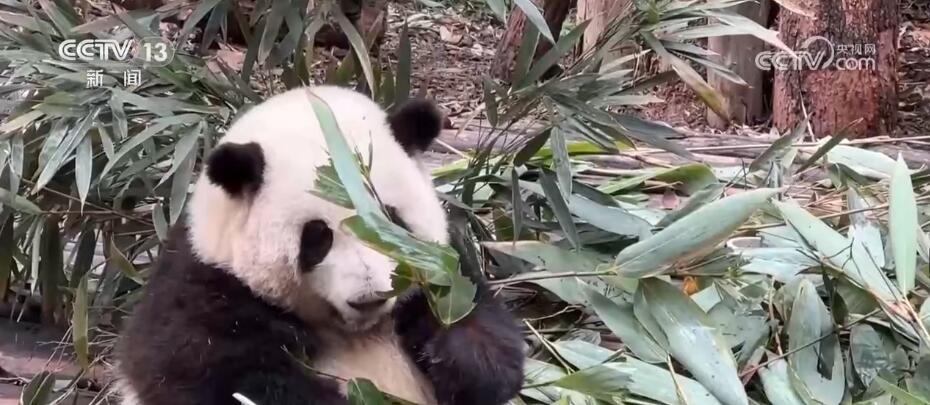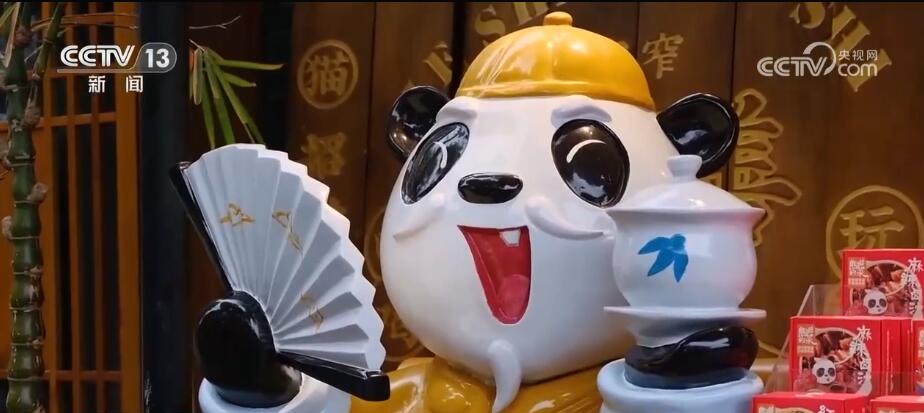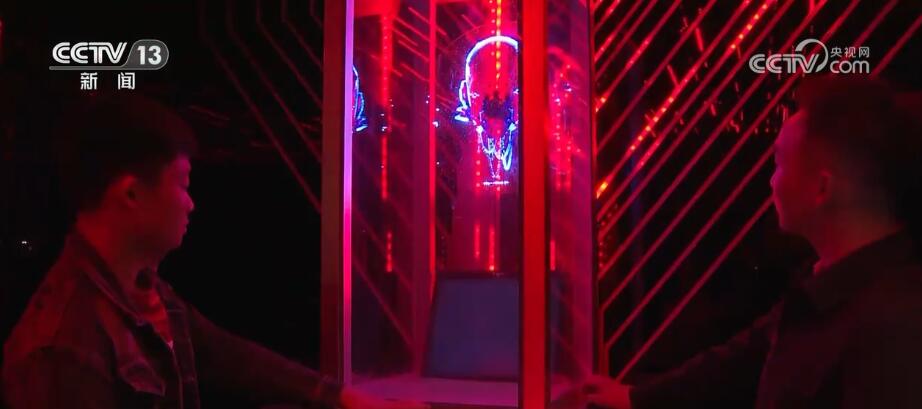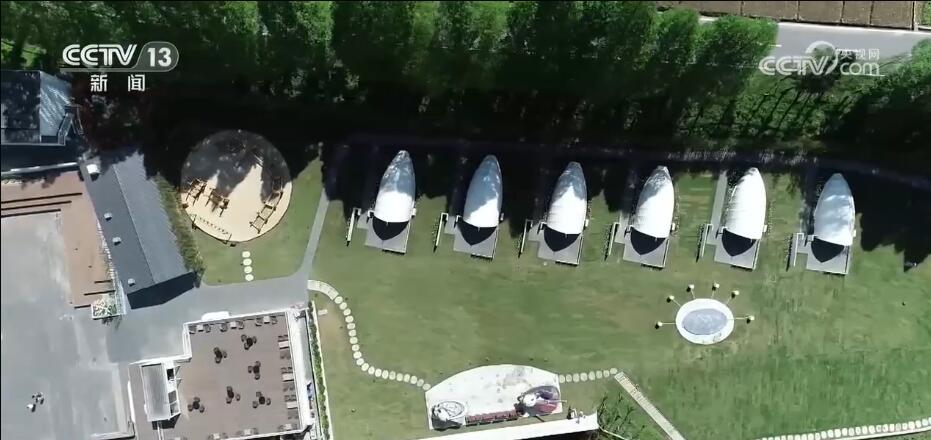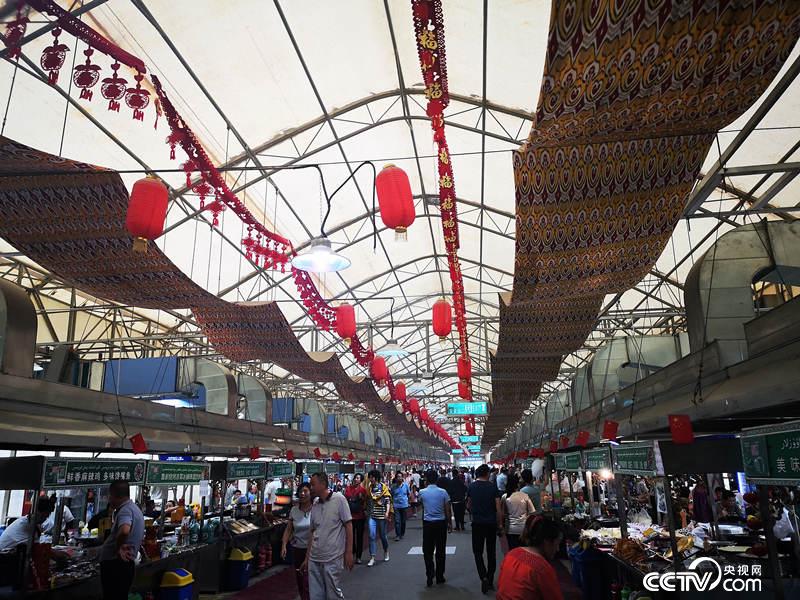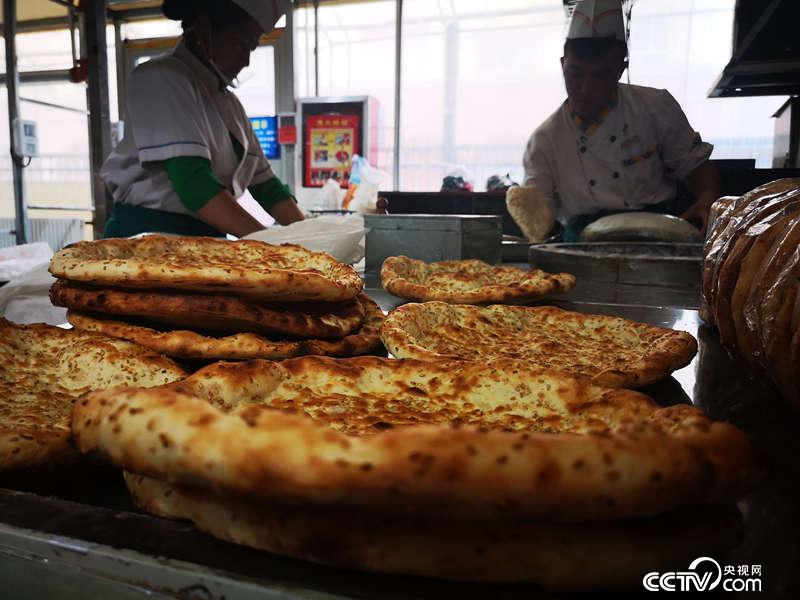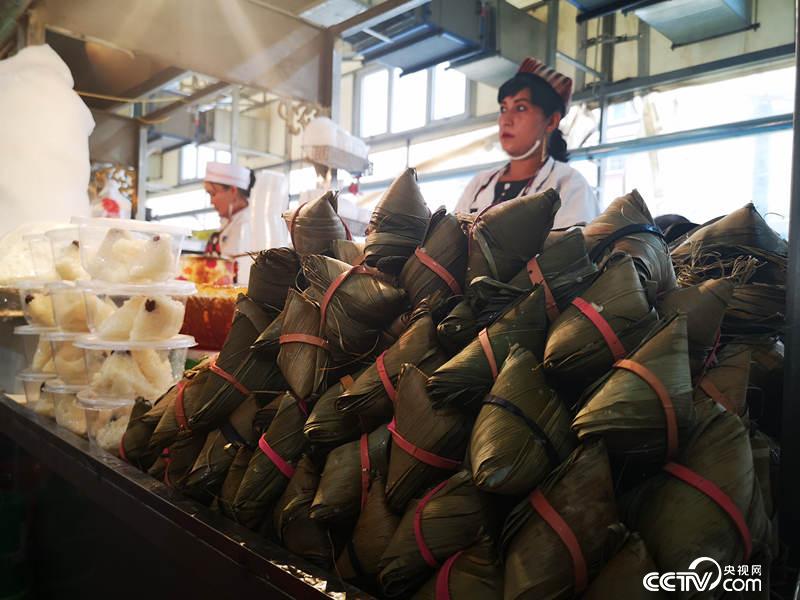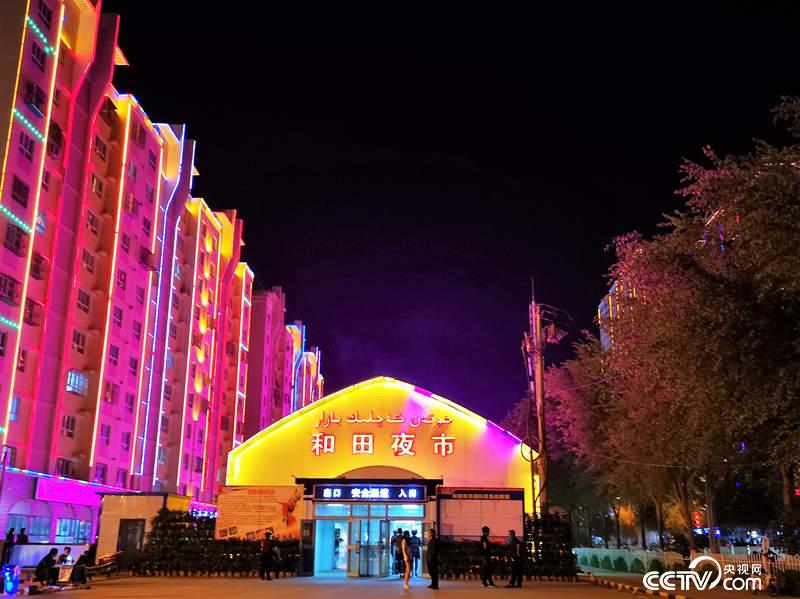Since the 18th National Congress of the Communist Party of China, the General Secretary of the Supreme Leader has been very concerned about the economic and social development of Inner Mongolia. In 2014 and 2019, he visited Inner Mongolia twice, and proposed that the energy-rich areas in Inner Mongolia, including Erdos City, are important national energy and strategic resource bases, and the article on modern energy economy should be done well.
From 2018 to 2021, the General Secretary of the Supreme Leader came to the Inner Mongolia delegation of the 13th National People’s Congress for deliberation for four consecutive years. In 2019, when attending the deliberations of the two sessions, the General Secretary asked Inner Mongolia to explore a new path of high-quality development that conforms to strategic positioning, reflects the characteristics of Inner Mongolia, and is oriented towards ecological priority and green development.
Ordos cadres and the masses bear in mind the entrustment of the General Secretary, seek a way out and blaze new trails in the transformation, lead quality change, efficiency change and power change with new development concepts, strive for progress steadily on the road of high-quality development, and reshape themselves.
Ordos, Inner Mongolia, surrounded by the zigzag bend of the Yellow River, covers an area of 87,000 square kilometers. A quarter of the world’s cashmere products are produced here. The proven coal reserves are 210.2 billion tons, accounting for about one-sixth of the country and one-half of Inner Mongolia. The proven reserves of natural gas are 4.9 trillion cubic meters, accounting for about one-third of the country.
In the past, when Ordos was mentioned, people would think of "sheep coal rustic". The energy structure is biased towards coal, the industrial structure is biased towards coal, and the economic structure is scattered. Non-coal industry accounts for only 32% of industries above designated size, and coal and related industries account for more than 50% of the total economic output, which can be described as "coal". "Mining coal to sell coal" was once the main economic growth mode in Ordos.
Travel far from you, forge ahead vigorously. Ordos opens the road to remolding: guided by the new development concept, it dares to break through the "ceiling" of development, constantly calibrates the "coordinate system", strives to be the vanguard of Inner Mongolia’s economic development, and gradually realizes the "gorgeous turn" of high-quality development in the new era.
"The road to remolding is a profound revolution, and it needs to show the courage to dare to try, dare to break and dare to stand, which is related to whether Ordos can continue to lead the economic development of Inner Mongolia." Li Li, secretary of the Ordos Municipal Party Committee, said that it is necessary to maintain strong political determination and win the green and low-carbon transformation war of this resource-based city.
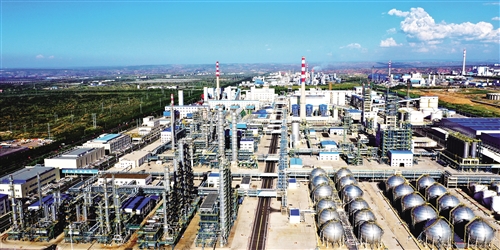
Jiutai New Materials in Dalu Industrial Park, Zhungeer Banner, Ordos City. Photo by Jia Xinlong (Zhongjing Vision)
Breaking the game, "partial students" want to solve the problem of one coal monopoly.
Every day at 12 noon, it is the maintenance time of Shangwan Coal Mine of Ordos National Energy Group Shendong Coal Group. More than 110 meters underground, Zhang Lihui, the mine manager, led the reporter along the gateway and approached the fully mechanized mining face. He said that as long as the shearer cuts down, more than 2,000 tons of coal will fall on the conveyor, be transported to the coal bunker by belt, and be washed and pulled to the port.
"We are an all-electric vehicle demonstration mine, using Shendong and Huawei to cooperate ‘ Kuanghong ’ Realized the domestic substitution of the main transportation system. " Zhang Lihui said that through digital and intelligent application, the annual power consumption of Shangwan Coal Preparation Plant has decreased by more than 8%, the production efficiency has increased by 5%, the average daily production time has been shortened by one hour, and the coal quality stability rate has increased from 83% to 95%.
Li Xinhua, chairman of Shendong Coal Group, a national energy group, said that after the General Secretary proposed to Inner Mongolia that "we should pay attention to fostering strengths and avoiding weaknesses, cultivating excellence and increasing efficiency, and go all out to transfer the structure, function and quality", they have been thinking about how coal enterprises develop, where the coal economy will go and how to become a benchmark for green, low-carbon and intelligent transformation.
Coal is an unavoidable topic in Erdos. There is coal in 80% of the city’s underground, and the prospective reserves are as high as one trillion tons, which can be dug for many years.
The industry in Ordos is "biased" seriously: of the 41 industrial categories in China, only 28 have statistics, only 6 account for more than 1% of the added value of industrial enterprises above designated size, and only one is coal; The characteristics of simplification and heaviness are obvious, the efficiency of resource utilization is not high, and the investment in scientific and technological innovation is insufficient.
Path change is first of all a change of ideas. Proceed from reality and be steady, even if there are some small fluctuations in the economy, we can’t change our direction. The Ordos Municipal Party Committee and the Municipal Government are making great efforts to study the assessment indicators of all flag areas in 2022, all of which are aimed at ecological priority and green development.
General Secretary of the Supreme Leader stressed: Inner Mongolia should base itself on its advantages, tap its potential, make full use of its strengths and make up for its shortcomings, and strive to change the situation that traditional industries are more emerging industries, low-end industries are more high-end industries, resource-based industries are more high-value-added industries, labor-intensive industries are more capital-intensive and technology-intensive industries are less, and build a new modern industrial system with diversified development and multipolar support, forming a new development pattern with outstanding advantages, reasonable structure, innovation drive, regional coordination and integration of urban and rural areas.
What kind of industry can carry the future of Ordos? Making the energy and chemical industry bigger and stronger is a solid foundation for the economic development of Ordos.
"The transformation and upgrading of coal-related industries should drive the transformation of industrial structure and the construction of modern industrial system." Qian Gexiang, deputy director of the Department of Political Science and Law Teaching and Research of the Party School of Ordos Municipal Committee, said that the reshaping of the industrial structure should be led through the reshaping of the coal industry.
Under the rigid constraints of double control of energy consumption and the goal of "double carbon", a number of large projects exceeding 100 billion yuan in Ordos have been delayed, and a number of chemical projects are difficult to put into production on schedule because of the failure to implement energy consumption indicators. The industrial transformation and upgrading of this city is to seek the optimal solution under various pressures and constraints.
The local government began to focus on the transformation and appreciation of resources in the development of resource-based industries.
"Coal is the source of wealth in Ordos." Standing in the night of Etuoke Economic Development Zone, Fujian businessman Zheng Bin said with emotion.
In the cold winter, a chimney behind him was burning with fire, which was the coke oven tail gas discharged after burning, and the locals called it "the sky lantern".
What attracts Zheng Bin to invest and build a factory is resources. Inner Mongolia Dongri New Energy Materials Co., Ltd., where he works, is based on the local industrial base and makes coke oven tail gas into methanol and synthetic ammonia; Buy coal tar to produce anode materials for high-end lithium batteries; Using the vast desert and abundant silica resources, from polysilicon production to photovoltaic modules, and finally building photovoltaic power plants.
The Etuoke Economic Development Zone has a coking capacity of 12.7 million tons of coal. The main product is coke, while by-products such as coke oven tail gas, benzene and coal tar may cause pollution. Under the background of energy consumption "double control" and "two high" projects, it is unrealistic to expand the total amount from the source.
What should we do?
"It is necessary to improve the comprehensive utilization efficiency of coal as a chemical raw material, promote the high-end, diversified and low-carbon development of the coal chemical industry, take strengthening scientific and technological innovation as the most urgent task, speed up key core technology research, and actively develop coal-based special fuels and coal-based biodegradable materials." Jia Rui, member of the Standing Committee of the Otog Banner Committee and secretary of the Party Working Committee of the Otog Economic Development Zone, took the team to repeatedly study this passage of the General Secretary.
"The resource industry is our advantage. Changing the development mode is not to abandon the resource-based industry, but to extend the resource-based industrial chain, turn the raw material industry into a material industry, and the industrial chain will go downstream and the value chain will rise to the middle and high end." Jia Rui said that when they figured it out, they set foot on the road of investment promotion by extending the chain to make up the chain.
After visiting Henan Pingmei Shenma Nylon Engineering Technology Co., Ltd. for six times, the two sides agreed on cooperation projects: benzene will eventually produce nylon through intermediate products such as cyclohexanol and adipic acid; The intermediate products of local chlor-alkali chemical industry polymerize with adipic acid to produce degradable plastics, or continue to produce spandex. The leap from coal to cloth imagined by Ordos people is becoming a reality.
In addition, after the comprehensive utilization project of coke oven tail gas is completed in 2022, "lighting the sky" will become history in Otog Banner. Jia Rui said that for the three by-products of coal coking, we should build a whole industrial chain, and use green coking as the industry name!
The wind of green circulation has also blown to the smelting industry. Gao Yanping, duty manager of Ordos Hydrocarbon Energy Company, said that they produce 120,000 tons of methanol by using 300 million cubic meters of tail gas from the silicomanganese submerged arc furnace every year. The 140 million cubic meters of waste gas generated in this process was repurchased by Inner Mongolia Tonghui Tianke Gas Co., Ltd. to produce food-grade liquid carbon dioxide.
"Resolutely part ways with the thinking mode and behavior habit of high pollution, high energy consumption, high cost and low-level repeated construction." Wang Bo, chief of the comprehensive department of the Development and Reform Commission of Erdos City, said that promoting the stock upgrading of traditional industries such as chemical industry, metallurgy, building materials and cashmere with green and low carbon, and leading the incremental transformation of industries such as equipment manufacturing and new materials with high-end demonstrations, so as to accelerate the construction of a new pattern of industrial development.
After investigating many western cities, Hunan Zhuzhou Times New Materials Technology Co., Ltd. settled Mengxi Branch in Dongsheng Equipment Manufacturing Base. Tang Gexin, deputy general manager, said, "Ordos has superior location, broad wind power application scenarios, and huge upstream and downstream supporting facilities." The company has an annual output of 1200 sets of fan blades, which are mainly supplied to the western market, including Yuanjing Technology Group, which leads the construction of zero-carbon industrial park in Ordos.
Ordos, rich in "black gold", began to deploy innovation chain and service chain around the new industrial chain.
"The most important thing is to change from resource-driven to innovation-driven, and do everything possible to grasp innovation." Du Huiliang, acting mayor of Ordos City, said.
At the beginning of 2021, among all 475 industrial enterprises in Ordos, less than 20% had innovative activities. After a year’s action of "three zeroes" (no R&D investment, no R&D institutions and no invention patents), 26% of enterprises have achieved "three zeroes", which has driven the R&D investment of enterprises on the regulations to 3.47 billion yuan.
Ordos regards innovation as the primary strategy and puts forward measures such as innovation chain integration of industrial chain and supply chain; In 2021, the special funds for science and technology at the city level will reach 540 million yuan, and will increase by no less than 15% for three consecutive years in the future; 30 new policies for talents were introduced, and 100 million yuan of financial funds were used to attract talents from all walks of life; Actively create national innovative cities and national laboratories, build high-level national high-tech zones, and build national sustainable development agenda innovation demonstration zones.
In order to optimize the industrial layout, Ordos focused on solving the problems of repeated construction, chaotic supporting facilities and lack of fist park and fist industrial chain of chemical projects in various flag areas, and completed the conversion of old and new kinetic energy. At the same time, it is also proposed to keep a close eye on "new specialty and high precision" and build industrial clusters of special metal materials, new chemical materials, new carbon-based materials and new bio-based materials; Keep a close eye on frontier fields such as life and health, semiconductors and aviation materials, and strive to achieve a breakthrough from "0" to "1".
Everything must be done, and then it can be done. From "raw materials" to "materials", the local conversion rate of Ordos coal is close to 22%. In the first three quarters of 2021, the energy consumption of the whole society decreased by 741,000 tons of standard coal compared with the same period of the previous year, and the energy consumption per unit GDP decreased by 8.8%.
The curtain of remodeling has been opened.
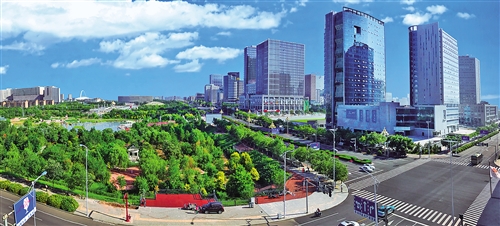
Picture Panorama of Rose Culture Park in Dongsheng District, Ordos City, Inner Mongolia. Photo by Liu Bolun (Zhongjing Vision)
Forced to overcome difficulties and get rid of "path dependence"
Per capita GDP is 2.3 times of the national average, energy consumption per 10,000 yuan GDP is 4.2 times of the national average, and per capita carbon emission reaches 6.9 times of the national average; Coal accounts for 86.7% of primary energy consumption, which is 29.9 percentage points higher than that of the whole country!
The intensity of energy consumption, high carbon dioxide emissions, high proportion of coal consumption, extremely sharp structural contradictions of energy, and rather intractable high carbon emissions have made Ordos people face enormous pressure and challenges.
This city, which thrives on coal, must make two preparations: not only should it consider how to reduce carbon, reduce carbon and decarbonize industries like other regions, but also realize the goal of double carbon as scheduled with the whole country, and also find new economic growth points when the leading industries are "subtracted".
While making a fundamental change in the development mode, Ordos people have found that bright color: to force the adjustment of the city’s industrial structure and energy structure with the goal of "double carbon" and firmly grasp the development opportunities of the new energy industry in transition.
In the words of Su Zhongsheng, member of the Standing Committee of Ordos Municipal Committee and Minister of Propaganda Department, Ordos can be transformed if there is no "double carbon"; However, without "strict coercion", the transformation will lack the sense of urgency and the sense of responsibility for action. Huang Bocheng, director of the Municipal Development and Reform Commission, said that the goal of "double carbon" has brought us a new opportunity to truly break the "resource curse" and get rid of path dependence.
To what extent is "forced"? In 2025, the installed capacity of new energy will exceed that of thermal power; In 2030, the total amount of new energy power generation will exceed that of thermal power generation. However, at present, the installed capacity of coal-fired power in Ordos accounts for 86.7% of the total installed capacity, and the installed capacity of renewable energy is still small. The consumption of renewable energy power is far below the national requirements for the responsibility weight of renewable energy consumption in Inner Mongolia, and the development of new energy is obviously lagging behind. It is not easy to "force"!
This change is not only an energy problem or an environmental problem, but also an overall, fundamental and systematic problem. The goal of "double carbon" can’t be achieved overnight, but it should be achieved step by step, first, the power system with new energy as the main body should be built, and then the use of fossil energy should be gradually reduced.
The Party Congress of Ordos City proposed to speed up the construction of a "scenery hydrogen storage vehicle" industrial cluster integrating energy production, equipment manufacturing and application demonstration, and to build a national new energy industry development demonstration base and an important source of green technology. It is also the first in the country to propose to build a zero-carbon industrial park and build a new power system demonstration city.
Wind, light, hydrogen, storage and vehicles are put forward in response to the simple extensive resource development model of "digging coal to sell coal and digging soil to sell soil".
Under heavy pressure, the real move landed. Each industrial chain of the five major industries is led by the municipal leaders, who thoroughly study the development pattern and trend of the industry at home and abroad, clarify the advantages and disadvantages of Erdos, find ways to make up the shortcomings, list the head enterprises in each link of the chain, attract investment with a clear aim, attract leading enterprises, attract upstream and downstream facilities, gradually develop from one enterprise to the industrial chain, and then gradually grow into an industrial cluster.
Located in Jiangsu Industrial Park in Ejinhoro Banner, the prospect modern energy equipment industrial park is in full swing. "Scenery hydrogen storage car" is the five major industries in the park, and the carrier is the first zero-carbon industrial park in China built by Vision.
Fan Fengdou, director of Yuanjing Modern Energy Equipment Manufacturing Project, explained: First, build a new power system with new energy as the main body; The second is to adopt real-time energy consumption and carbon emission management; The third is to export zero-carbon industry standards and norms, build an ecological chain, and build the last mile of zero-carbon industrial park through green certificate subscription, carbon sink trading and carbon emission rights trading.
In his view, Ordos, with superior geographical location, excellent new energy resource endowment and broad application scenarios, has provided superior element support for the development of the future, and the company’s technology accumulation in the source network has been used for many years.
After the arrival of Yuanjing Science and Technology Group, the leaders of Ordos City went to Shanghai, where Yuanjing headquarters is located, to hold investment promotion meetings for 36 upstream and downstream supporting enterprises, and so far 7 enterprises have signed contracts.
Feichi technology is coming! The first batch of hydrogen energy buses have been put into use after the construction of the hydrogen energy industrial park.
SAIC Hongyan is here! On November 22, 2021, the first batch of hydrogen heavy trucks delivered by SAIC Hongyan to users in Ordos City were put into operation.
Ordos also encourages leading enterprises such as Yuanjing and Jiutai to carry out research on key materials, units, modules, systems and recycling technologies for energy storage, aiming at solving the problem of new energy consumption.
"Changing ideas, transforming wind, light and hydrogen into green energy, cooperating with energy storage, doing a good job in new power systems, simultaneously introducing corresponding equipment manufacturing, integrating into the application scenarios of power heavy trucks, and opening up the industrial chain can form an industrial cluster of 100 billion yuan." Wu Yun, acting flag-bearer of Ejinhoro Banner in Ordos City, was very excited.
Ordos has successively signed cooperation agreements with 14 projects such as SAIC and CRRC Zhuzhou, and 33 projects such as Zhonglai Photovoltaic have signed cooperation agreements with the flag area. Most of these projects are "scenery hydrogen storage vehicle" new energy industry chain projects, which will form a strong support for the city’s economic development and industrial transformation after landing.
A good start made Erdos full of confidence.
During the two sessions of the National People’s Congress in 2021, when attending the deliberation of the Inner Mongolia delegation, General Secretary of the Supreme Leader stressed that it is necessary to identify the positioning of Inner Mongolia in building a new development pattern in the country, deeply analyze its own advantages and shortcomings, further clarify the key industries and main directions of economic development, and promote related industries to move towards high-end, intelligent and green, develop strategic emerging industries and advanced manufacturing industries according to local conditions, and promote infrastructure construction as a whole.
The earnest entrustment of the general secretary has inspired a steady stream of power for Ordos to reshape the energy industry.
Forced to "force" out of productivity.
In batuta Village, Wulanmulun Town, Ejinhoro Banner, the "Tianjiao Green Energy 500,000 kW Photovoltaic Power Generation Demonstration Project for Ecological Treatment of Coal Mining Subsidence Area" has realized grid-connected power generation. In addition to power supply, we will cultivate in the shallow subsidence area of coal mining, dig ditches and build ponds, and plant fruit forests to realize the reuse of abandoned land.
Xue Feng, deputy general manager of Yizheng New Energy Technology Development Co., Ltd., Inner Mongolia Shengyuan Energy Group, who is in charge of the project, said that they also plan to build a photovoltaic power station with an installed capacity of 6 million kilowatts, with an average annual power generation of about 10.8 billion kWh and an annual output value of about 3.1 billion yuan, so as to realize the organic unity of resource development and economic, ecological and social benefits in the mining area.
Duan Zhiqiang, chief of the comprehensive planning section of Ordos Energy Bureau, brought a set of more intuitive data: during the "14 th Five-Year Plan" period, Ordos plans to implement 77 new energy projects such as landscape ecological management with an investment of 289.5 billion yuan; There are 8 green hydrogen industry demonstration projects with an investment of 67.058 billion yuan.
Forced to "force" creativity.
In order to accelerate the exploration of peak carbon dioxide emissions’s carbon neutrality path and strengthen the support of scientific theory, Ordos established the Carbon Neutralization Research Institute in September 2021, which is the first carbon neutrality research institute in Inner Mongolia. At the beginning of its establishment, it signed an agreement with Peking University and Tsinghua University to build a laboratory, and borrowed each other’s advantages to enhance its innovation ability.
Bai Yang, director of the project development department of the research institute, said: We will study carbon emission reduction and carbon transformation to realize the integration of information, technology, data and capital.
Forced to "force" the imagination.
Walking to the middle section of Kubuqi Desert, the drone looked around Dalat Banner, and a horse pattern consisting of 196,320 photovoltaic panels was panoramic. Looking up at low altitude, pieces of fish-scale single-crystal double-sided photovoltaic panels are arranged in a patchwork manner on the sand, and automatically rotate twice every minute with the change of the position of sunlight, which is like a shadow. On the side of the photovoltaic light-chasing board, there are four big diamond-shaped brands: sand turns into gold.
The total usable land area of Ordos is nearly 4 million mu, and the total installed capacity of exploitable photovoltaic is about 110 million kilowatts. The area with large-scale development of wind power projects is about 6758 square kilometers, and the total installed capacity of wind power that can be developed is about 15.25 million kilowatts. The 1 million kilowatt photovoltaic leader base implemented in Kubuqi Desert has been fully connected to the grid, making it the largest centralized contiguous photovoltaic power generation base in China.
"The back of the photovoltaic panel can also accept the reflection on the desert, thus improving the power generation effect by 5%." Wang Baohe, deputy director of the Development and Reform Commission of Dalat Banner, said that during the "Tenth Five-Year Plan" period, Dalat Banner will continue to increase its installed capacity by about 9 million kilowatts, and it is expected to become a demonstration base for comprehensive development of 10 million kilowatts by 2025.
Power generation on the board, planting under the board; Complementary forest and light, multiple power supply; Ride the wind and drive the light. This is the "Mongolian horse spirit" of Wang Yang wanton, which is the "aura" of Erdos.
Seek the distance, the ecological priority after "the pain of the skin"
"Building Inner Mongolia into an important ecological security barrier in northern China is a strategic positioning based on the overall situation of national development, and it is also a major responsibility that Inner Mongolia must consciously shoulder." The people of Ordos remember what the General Secretary said when he visited Inner Mongolia in 2019.
"Ordos is very painful to the ecology. Here, ecological construction is endless, and ecological priority will always be given when conflicts occur. " Liu Xiaofeng, member of the Standing Committee of Ordos Municipal Committee and deputy mayor, said that its geography and landforms can be summarized by two "48%" — — 48% is desert, including Kubuqi Desert and Mu Us Sandy Land; 48% is hilly and gully region, where the soft sandstone is dispersed in the wind and melted in the water, which is one of the main sources of sediment in the Yellow River.
As the second longest city where the Yellow River flows, Ordos has always regarded the ecological protection and high-quality development of the Yellow River basin as a major political responsibility. The channel of the Yellow River is zigzag from top to bottom, Ordos is in the embrace of zigzag bend of the Yellow River, and Kubuqi Desert, which spans the west and east, runs side by side with the Yellow River. Water and sand are the protagonists of ecological construction in Ordos.
"Welcome to the Yellow River to see other scenery." Chang Hai, member of the Standing Committee of Hangjinqi Committee and Minister of Propaganda Department of Ordos City, updated his circle of friends: a picture of the Yellow River and a photo of the desert snow scene. He photographed the flowing landscape of this winter by the Yellow River. The cold wind roared, and a large area of white ice flowed along the main river with thick snow, which was spectacular.
Hangjinqi has been facing a dilemma for a long time: in the dam, the Yellow River water is mostly in trouble during the flood season; Outside the dam, the Kubuqi desert, which accounts for 52% of the flag area, is dry and short of water. In order to prevent the ice flood disaster, Qili has invested more than 10 million yuan every year to rescue and reinforce the dam, which is tantamount to adding insult to injury to Hangjinqi’s already weak economic foundation. Kubuqi Desert, which is adjacent to the Yellow River, is the nearest source of sandstorm to Beijing and Tianjin. The ecological environment is extremely fragile, and a large number of sandstorms roll into the Yellow River in winter and spring.
"In the past, there was no spring here, because there was no vitality until May and June." Yang Yongmao, former deputy director of Hangjinqi Water Conservancy Bureau, said.
"My bowlegged leg ran out in the desert." The 43-year-old herder named Gacha in Huangjiehao, Jiri Galang Town, Hangjinqi brought the reporter sea red fruit and milk tea.
When I was a child, I grazed, and there were few desert plants. The cattle and sheep that grew up eating camel bones were very thin. It was supposed to take six or seven days to dig a deep pit in the desert to drink cattle and sheep, but after ten days, the puddle was buried by sand again.
Trapped between water and sand, Hangjinqi people have a bold idea — — Dig a canal to divert water from the Yellow River into the sand!
In 2013, Hangjinqi invited experts to conduct on-the-spot investigation and demonstration, and compiled a feasibility study report. The conclusion is gratifying: introducing Lingshui into the desert depression to form a water surface during the high water level of the Yellow River ice flood can improve the desert ecological environment, achieve a win-win situation of reducing flood control pressure and sand control, and turn harm into benefit.
During the flood season in 2014, the Yellow River Lingshui was introduced into the hinterland of Kubuqi Desert for the first time. Since 2015, 360 million cubic meters of Lingshui has flowed into the Kubuqi Desert, forming a desert water ecology that stretches for hundreds of square kilometers.
The sand dunes are silky, the water surface is clear, and the sand and water are connected. Hippophae rhamnoides and newly planted poplars can be seen everywhere, and the leisurely white swan adds vitality to this wonderful still life picture.
Today, in addition to more than 70 cattle and sheep, it is rated that the survivors have contracted the desert reservoir to raise crabs and sell wild carp, earning more than 200,000 yuan a year. Desert quenches thirst, herders relieve worries, lush plants save forage, and the slaughter rate of cattle and sheep is also high. Cattle raised in three years are stronger than those raised in the past 10 years.
"In February 2020, I saw thousands of white swans in this desert water ecology." Yang Yongmao said that the Kubuqi Desert finally has spring.
Protecting the ecological environment means protecting the productive forces, and improving the ecological environment means developing the productive forces. At the moment of spring, Yang Yongmao really understood the essence of the general secretary’s ecological civilization thought — — A good ecological environment is the most inclusive welfare of people’s livelihood.
It’s not without detours. A few years ago, the Yellow River just entered the desert, and the grass grew vigorously. Every family raised more cattle and sheep, and the grass was not enough at once. When raising crabs in the first year of life, many seedlings were put in the pond, because the density was too high to grow well, so they could only be sold at a low price. Since then, he and farmers and herdsmen have understood that the carrying capacity of nature is limited. Only by fixing livestock with grass and production with water and loving this green water and green mountains can there be Jinshan Yinshan.
"The environment limits people’s imagination. Many people once thought that it was a fantasy to draw water from the Yellow River, just like building a sand road in those days. " The rated sand-crossing highway has been built since the early 1990s.
"Yellow sand is rolling all over the sky, and the lighting table in the house during the day. Pedestrians can’t see the road when they go out, but crops and pastures are buried in the sand … …” This local ballad sang the helplessness and pain of farmers and herdsmen in the hinterland of the desert at that time.
In 1997, Hangjinqi mobilized the people of the whole banner to "think big, plan far, do solid and do nothing" and go into battle to build a sand-crossing highway.
Jia Bei, a young man from Hangjinqi, remembers that when he started to build roads, he was at the starting point of building roads at the age of 8 — — Yi and Wusu Sumu Bayin Wusu Gacha went to school. Children go to the road construction site in grades, and bring water to adults in pairs, or water newly planted trees.
Jaber said that in order to avoid "I repair today and bury the sand tomorrow", people tried to "lock in the north and block in the south and cut in the middle", laying more than 20 million hectares of sand barriers under the tuyere, planting millions of saplings and building the first sand-crossing highway in three years. In the past 24 years, six sand-crossing highways have been built for the second time, and Kubuqi Desert has become the only desert in the world that has been successfully managed as a whole.
Today, the Mu Us sandy land has been comprehensively managed, with a vegetation coverage rate of over 70%; Kubuqi desert has been treated by more than 30%. Reducing the amount of sediment flowing into the Yellow River has become the biggest task of ecological construction in Ordos.
At the symposium on ecological protection and high-quality development in the Yellow River Basin, the Supreme Leader General Secretary pointed out sharply: "The Yellow River has less water and more sediment, and the relationship between water and sediment is not harmonious, which is the crux of the Yellow River’s complexity and intractable."
Standing in front of Xiliugou, Zhang Yunfei, Deputy Director of Water Resources Bureau of Dalat Banner, laid out the drawing of Ecological Protection and High-quality Development and Governance Plan of Dalat Banner Section of the Yellow River.
In Dalat Banner, 10 first-class tributaries of the Yellow River, which are arranged in the east-west direction, pass through the hilly and gully area in the upper reaches, the sand-blown area in the Kubuqi desert in the middle reaches and the alluvial plain in the lower reaches in turn from south to north, and transport 20 to 30 million tons of sediment to the Yellow River every year, commonly known as 10 large holes (seasonal rivers), and Xiliugou is one of them.
"The problem lies in the Yellow River, but the root is in the basin." Zhang Yunfei said. After the symposium on ecological protection and high-quality development of the Yellow River basin was held, Ordos quickly issued a road map of 10 major holes for treatment, and the party and government leaders at all levels in the city, counties and towns took charge of the hole for long.
"At the beginning, farmers and herdsmen passively controlled soil erosion for survival. Now we have a set of systematic projects." Zhang Yunfei said that the upstream implementation of gully interception projects in hilly and gully areas will allow low-sediment water to flow into the mother river; Fixed mobile and semi-mobile sand dunes in the middle reaches, creating windbreak and sand-fixing forest belts to prevent sedimentary sand from entering the Yellow River; Improve dike standards downstream and reduce non-point source pollution. A comprehensive prevention and control system of soil and water conservation has been initially formed in Dalat Banner, which reduces the amount of sediment discharged into the Yellow River by about 9.9 million tons every year.
At present, in the 10 major remediation actions, Ordos hopes to combine ecology with the production and life of ordinary people to achieve clear water, smooth rivers, beautiful scenery, green shores and rich people. In Dalat Banner, grazing prohibition is implemented in the whole region, laying the foundation for centralized captivity through the construction of grassland and forage base, and implementing the most stringent water resources management standards, with water for people, production, land and city.
Integration, gathering strong endogenous power in rural areas
Once upon a time, "relying on the sky to eat" was the normal life of farmers and herdsmen in Ordos.
"Road, electricity and information are the three major obstacles to our development." Meng Kedalai, a herdsman from Daotu Gacha, Duguitala Town, Hanggin Banner, Erdos, recalled: It takes more than ten kilometers to buy a box of matches in the sand; The local government allocated Gacha a 12-inch black-and-white TV. Herdsmen were watching the series "Huo Yuanjia", and suddenly the power went out because the wind generator didn’t work.
After the first sand-crossing highway was completed, Meng Keda came to marry his daughter-in-law into the door. In 2006, he moved from the desert to the herdsmen’s new village built by the local government and opened a restaurant to sell his own beef and mutton. In 2012, Meng Kedalai started animal husbandry with several herdsmen, and operated tourism projects such as desert hiking, sand skiing cross-country and jet skis, with an annual income of 200,000 to 300,000 yuan. His mother joined the "Gu Ru Ge" team, which attracted tourists, catering, accommodation and amusement projects.
"Completing poverty alleviation is only the beginning." Liu Haijun, deputy director of the Rural Revitalization Bureau of Ordos City, said that the rural areas of Ordos need to be refined, carefully carved and simmered.
This is undoubtedly another deep "remodeling".
The General Secretary of the Supreme Leader pointed out that the depth, breadth and difficulty of fully implementing the rural revitalization strategy are no less than tackling poverty. It is necessary to improve the policy system, work system and institutional system, accelerate the pace of agricultural and rural modernization with more powerful measures and gather more powerful forces, and promote high-quality and efficient agriculture, livable and suitable rural areas, and rich farmers.
High standards to promote the overall revitalization of rural areas, Ordos closely follows the market demand, based on resource endowments, and pays special attention to industrial prosperity.
"The sunshine is sufficient, the air is clean, the water quality is excellent, and there are many naturally formed natural alkali lakes. Etuoke Banner is especially suitable for the growth of spirulina." Su Yongning, founder of Inner Mongolia Zaihuitou Bioengineering Co., Ltd. said. As early as 2003, he set foot in spirulina culture, and now he provides algae species, culture technology and processing technology for local cooperatives and farmers and herdsmen. There are more than 30 market players of spirulina culture in Otog Banner, and Su Yongning alone employs more than 50 farmers and herdsmen. In 2020, Spirulina in Otog Banner was selected as the second batch of protected geographical indications in Central Europe.
"Using the unique regional advantages and natural environmental conditions, combined with modern science and technology, we will establish a linkage mechanism for the interests of agricultural enterprises, and radiate the surrounding farmers and herdsmen to increase their income and become rich." Su Yongning said that the so-called rural revitalization means working together and growing together.
In Arbas Sumuhu and Tolegacha in Otok Banner, the herdsman Hubis Halatu is a big breeder of Arbas cashmere goats.
This kind of goat is a rare breed with excellent meat and cashmere. Its cashmere is known as "fiber gem" and "soft gold" and has won the Italian "Chagner" award for many times.
"In the past, sheep were raised extensively. In order to pursue disorderly hybridization of output, the fineness of cashmere became thicker year by year, and it could not sell at a good price, and the quality of mutton was not high. The number of sheep is increasing, and the grassland is overwhelmed. In this way, it is actually not worth the loss. " Hubis Haratu said.
Hubis Halatu is an extension herdsman of Erdos Group’s superfine cashmere goats, and he is also a rich leader with an annual income of more than 500,000 yuan. With the help of the local government, he has installed a variety of modern pasture equipment such as automatic feeding machine, automatic water dispenser and intelligent video system. He hopes to protect the grassland better while raising Albas cashmere goats.
As a partner of Hubis Halatu, Wang You, deputy general manager of the cashmere spinning division of Ordos Group, said: "Ranch activities and cashmere goat breeding are the forefront of the cashmere industry chain. Only the green grassland can raise excellent cashmere goats." Ordos Group implements the subsidy policy of high quality and good price, and gives subsidies to herders according to the different fineness of cashmere, so as to guide herders to take the road of high-quality development of cashmere goat breeding.
When ecological construction and industrial construction complement each other, the pace of rural revitalization is more solid.
Taking rural revitalization as the general starting point to solve the problems of "agriculture, countryside and animal husbandry" in the new era, Ordos has innovated governance means and deepened agricultural and rural reform while developing advantageous industries, carrying out moderate scale operation and promoting the branding of agricultural and animal husbandry industrialization, so as to stimulate the strong endogenous power of rural revitalization.
"No one, no land and no money are the bottlenecks in the development of many rural pastoral areas. How can the countryside be revitalized without rice and even chickens? " Qiao Youshi, mayor of shulinzhao town, Dalat Banner, was deeply touched by this.
In order to solve the problem that farmers’ financing is difficult and expensive, in 2017, shulinzhao town began to set up mutual funds cooperatives with villagers’ shares as the main source of funds, and the village has since had simple financial tools. Villagers can borrow money paid according to the needs of production and life, with low interest and simple procedures. "Ni Youfu, a chicken farmer in our village, has weathered the storm by borrowing from the credit cooperation department and has become a large chicken farmer in the village. You only need to pay a down payment to buy a house in this village, and mortgage a loan from a mutual fund cooperative by virtue of a contract. " Ma Sanzhan, Party Secretary of Linyuan Village, shulinzhao town, said.
At present, credit cooperation departments have been established in nine administrative villages in shulinzhao town, with funds reaching 16.88 million yuan, accumulated loans of 27.21 million yuan and interest income of 1.25 million yuan, benefiting 823 farmers without any bad loans.
In 2020, shulinzhao town established the Rural Property Rights Service Center, which is the only township-level rural property rights trading platform in Inner Mongolia, and has developed four products, including land management rights, rural houses and homestead use rights.
"On the surface, the integration is land, but it is actually for the long-term interests of farmers and herdsmen." Shulinzhao town Rural Property Service Center Liu Bonan said.
It is difficult to break through the income bottleneck by farming alone; As the most important means of production in rural areas, land is not integrated and industries are difficult to develop; But enterprises always want to hold land for the longest time at the cheapest price. What should we do?
The first step is to sort out the village collective assets. The village will concentrate scattered plots, and the cooperatives will hang hundreds or even thousands of acres of complete plots on the trading platform, which will thus have the right to negotiate with enterprises.
The second step is to change the concept of enterprise. "The reason why I gave you a large piece of complete land is that I hope that the village collective and farmers can share the results." Liu Bonan said that enterprises need to look at the rural resource market rationally and change from making money at the production end to making money at the circulation end.
The third step is to advocate cooperative management between enterprises and farmers. Through the guaranteed bottom plus dividend model, most of the risks are borne by enterprises. In 2021, shulinzhao town Rural Property Service Center introduced soybean breeding enterprises, and began a new soybean variety breeding experiment on 650 mu of land.
"If the harvest fails, the average income of planting corn with the same soil fertility will guarantee the people and eat a reassurance; If it is profitable, it will be distributed through cooperatives. " Liu Bonan said that 2022 will be a year of explosive growth in platform transactions.
Resource integration, efficient utilization, value amplification and concept change, step by step, create a path of common prosperity.
From "suffering from sand for a long time" to making money from sand, from "making something out of nothing" to selecting the best from the best, from lack of property income to revitalizing sleeping resources, it is a vivid portrayal of Ordos rural revitalization, improving productivity and rebuilding competitiveness.
Go to the middle of the mountain without stopping, and hit the water in the middle stream before starting. Ordos is painting the picture of the times of rural revitalization with great enthusiasm.
Stick to it and enhance the integrity and coordination of development.
It goes without saying that it is difficult to rebuild Ordos.
This remolding of deepening the transformation of reform kinetic energy and changing from quantitative to quality has many pain points, blocking points and difficulties for Ordos.
The pain lies in the lack of support for innovation ability. Innovation is the most important variable for future development. Even in the surrounding core urban agglomerations, the investment intensity of basic R&D and the proportion of strategic emerging industries in the added value of industrial enterprises above designated size are low, and the innovation strength of key technologies and key fields needs to be improved.
Blocked in the tightening of factor constraints. Because the land is vast and sparsely populated, the distribution of productive forces is scattered, the efficiency of land use is low, and the contribution rate of GDP per mu and tax revenue is small; Water, land, environment and other indicators are stretched; The supply of labor force is insufficient and it is not attractive enough for high-tech talents.
It is difficult to find differentiated competitive advantage. Ordos is close to the surrounding cities in terms of resource endowment, industrial structure and industrial base, and the phenomenon of product homogenization and industrial homogenization is prominent, and the competition in the fields of industry, science and technology is becoming increasingly fierce.
The reason why Erdos remoulding strives for progress in difficulties and shines in difficulties is that it has found a scientific methodology in the long road and benefited from the "baton" of the new development concept to be effectively reflected in all aspects of economic and social development. Clear problem-oriented, goal-oriented and effect-oriented, the pain point is the breakthrough point, the blocking point is also the breakthrough point, and the difficulty is the focus.
This is the "remodeling" of deepening reform and adhering to innovation drive. Ordos puts the development base on innovation, drives the overall situation with breakthroughs in important fields and key links, promotes the development of new kinetic energy with innovations in various fields, and comprehensively strengthens innovation in concepts, science and technology, industries, systems and models to fully stimulate vitality.
This is a "remodeling" to enhance the integrity and coordination of development. Ordos will strengthen exchanges and cooperation with Beijing-Tianjin-Hebei, Yangtze River Delta, Guangdong, Hong Kong and Macao, Guanzhong urban agglomeration and other regions, deeply participate in Hubao-Eyu urban agglomeration, form integrated development, and promote infrastructure interconnection, ecological environment protection and joint governance, collaborative innovation of industrial systems, and convenient sharing of public services.
This is the "remodeling" of precise force. Make up the shortcomings of developing production-oriented and life-oriented service industry, and solve the problems of insufficient total public services, structural mismatch and poor quality; Combine local advantages to establish development strategy and identify the truly suitable industrial track; Attracting talents and population matched with economic and social development with hard strength and soft environment.
This is a "remodeling" for a long time. Let the whole new energy industry chain take root in Ordos and form an industrial agglomeration effect, bringing an innovation, upgrading and demonstration of development concept to the "Ji" bend area of the Yellow River; Do not exchange economic growth at the expense of the ecological environment, promote the harmonious coexistence of people, nature and regions, and achieve higher quality, higher level, more balanced and coordinated development.
Cultivate new economic growth points through the second venture, and build the core competitiveness of the city … … The gross domestic product of Ordos region ranks first among all the allied cities in Inner Mongolia Autonomous Region for 12 consecutive years.
"Although some initial achievements have been made, the remodeling of Ordos has just begun, far from being able to relax." Li Li said that the insufficient development imbalance is still the basic market situation, and there are still many bottlenecks and shortcomings. There is still a big gap between the business environment and the coordination of urban and rural development and other factors compared with the developed areas in the east. There are still many weaknesses in the fields of people’s livelihood security, social governance and ecological environment. Only by working hard for a long time and moving forward can we live up to the expectations of the General Secretary.
It is difficult to know, but it is difficult to do; It is difficult to do it, but it is difficult in the end.
On the new journey, Ordos is like a black horse, sticking to its goal, anchoring its direction, full of lofty sentiments and ambitions, and galloping in the grassland desert.
(Member of Economic Daily Research Group: Zheng Bo Chen Li Chen Yingying Liang Jianxiao Yu Yang Yu Jian)
























